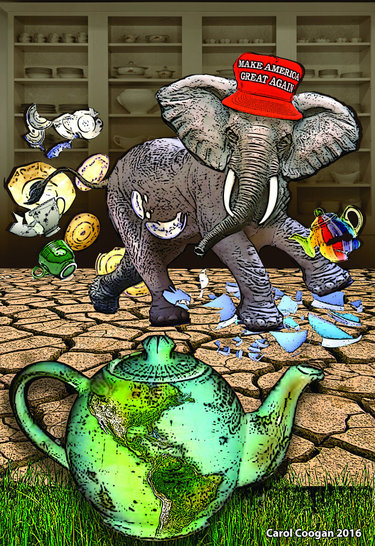The peoples of the world need to work together to save themselves
For a quarter of a century, we have written on this page about the things we, as individuals, could do to stave off climate change — like composting, recycling, conserving energy, and the like. At the same time, we called for government leadership to solve a problem that individuals alone couldn’t.
In the old days, we cited scientists to convince our readers — the skeptics wrote letters of protest, which we published — that global warming was real and could destroy our Earth if stringent measures weren’t taken, and soon.
The Earth’s carbon emissions have been rising ever since the Industrial Revolution, creating what scientists call the greenhouse effect, trapping heat within the planet’s atmosphere, and shifting the normal climate.
Gradually, our readers, like the vast majority of Americans, grasped the reality of the threat.
Last year, at last we could write an editorial full of hope for the future, for the preservation of our planet. An agreement was reached in Paris where, for the first time, all the nations of the world, 195 strong, participated — the rich and developed nations along with the poor and undeveloped nations.
For the first time, a series of requirements, binding nations by law, to cut emission was put in place, and representatives from all the counties in the world were to meet again in 2020 and every five years thereafter to continue with further plans to cut emissions.
Now we have a president-elect who has repeatedly called global warming a “hoax.” Donald Trump has said he won’t abide by the Paris accord. He has even gone so far as to suggest climate change is a plot hatched by the Chinese.
The United States is second only to China in its carbon emissions and needs to take a leadership role if the Paris agreement is to work.
We had hope, until last week when Trump appointed Myron Ebell to lead the transition at the Environmental Protection Agency, that Trump’s wild rhetoric might be just that. After all, in his acceptance speech on Election Night, he said that Hillary Clinton — the opponent he had threatened to jail and for whom his supporters repeatedly chanted “Lock her up!” — was owed “a major debt of gratitude for her service to our country.”
Similarly, after leading a campaign based on divisiveness — just one example, calling Mexicans rapists who bring drugs and crime, and then having as his supporters chant “Build the wall!” — Trump, in that speech, called for “Americans to bind the wounds of divisiveness…to come together as one united people.”
His appointment of Ebell, a climate-change denier, certainly suggests Trump would like to follow through with his threat to ignore the Paris agreement. Ebell himself has called climate change a hoax perpetrated to harm America’s economy.
We can’t go back in time — back to a United States that thrived on manufacturing jobs that have since been automated, that heedlessly spewed out carbon waste without understanding its impact. We are now part of a global economy and would be wise to look not just at our own immediate needs with a sense of entitlement.
The hope was that, with the Paris agreement in place, investors, heartened by the legal commitment, would produce more jobs and products for sustainable energies like wind and solar. We’ve seen a boom for renewable energy here in New York State because of incentives from both the state and federal government.
Even with a president who could see the importance of saving the planet, it was still going to be touch and go to get us out of our current dilemma. The Paris agreement alone would cut greenhouse gases by only half as much as is needed to prevent the increase of 2 degrees Celsius that scientists say would cause devastating and irreversible consequences.
Trump has blithely said that weather changes. But climate is different than weather.
We’ve received all manner of press releases this week from groups trying to rally support to mitigate the harm they see coming in a Trump Administration.
“More than ever before, it will be up to the states to lead on fighting climate change and protecting the environment,” said the New York League of Conservation Voters. And, yes, we support states’ initiatives — like New York’s promise to have half of its electricity come from renewable sources by 2030 — to enact energy policies that will reduce carbon emissions.
But it is not enough. We need federal leadership here if we, and the rest of the world, are to survive.
It doesn’t matter what political party you belong to. It doesn’t matter what religion — or none at all — you follow. It doesn’t matter what your ethnicity is or what country you come from. It doesn’t matter what your gender is, or what your sexual orientation is.
If you are a human being, you and your children and your children’s children will be harmed if we don’t — as a world community — combat climate change.
We’ve already witnessed the sorts of disasters scientists say will become commonplace. On these pages, we’ve detailed extensive studies on how we in upstate New York will be and are being affected by climate change — and not just humans, but plants and animals, too.
There will be severe flooding in some places with equally severe droughts in others. Sea levels will rise enough to obliterate some island countries as well as devastate many coastal cities. There will be more of the destructive storms — like Tropical Storm Irene that we suffered in our midst. And there will be food and water shortages in places around the globe.
Are we going to wreak this sort of havoc on our world and our future by pretending climate change isn’t real?



